Three Roads To Quantum Gravity
Three Roads To Quantum Gravity
Three Roads To Quantum Gravity
You also want an ePaper? Increase the reach of your titles
YUMPU automatically turns print PDFs into web optimized ePapers that Google loves.
50 THREE ROADS TO QUANTUM GRAVITY<br />
thing about their histories, both recent and ancient, that we<br />
begin to gain any insight into why being human is expressed a<br />
bit differently in different parts of the world. This may be<br />
obvious, but why should it be so? What is it about a person or<br />
a culture that makes it so hard to describe without telling<br />
a story? The answer is that we are not dealing with a thing,<br />
like a rock or a can opener. These are objects which remain<br />
more or less the same from decade to decade. They can be<br />
described, for most purposes, as static objects, each with<br />
some collection of unchanging properties. But when we are<br />
dealing with a person or a culture we are dealing with a<br />
process that cannot be comprehended as a static object,<br />
independently of its history. How it is now is incomprehensible<br />
without knowing how it came to be.<br />
Just what is it about a story that tells us so much? What<br />
extra information are we conveying when we tell a story?<br />
When we tell a story about someone we narrate a series of<br />
episodes in their life. These tell us something about that<br />
person because we believe, from having heard and understood<br />
many such stories, that what happens to a person as<br />
they grow up has an effect on who they are. We also believe<br />
that people's characters are best revealed in how they react to<br />
situations, both propitious and adverse, and in what they<br />
have sought to do or become.<br />
However, it is not the events themselves that carry the<br />
information in a narration. A mere list of events is very boring<br />
and is not a story. This is perhaps what Andy Warhol was<br />
trying to convey in his movies of haircuts or of a day in the<br />
life of the Empire State Building. What makes a story a story<br />
is the connections between the events. These may be made<br />
explicit, but they often do not need to be, because we ®ll<br />
them in almost unconsciously. We can do that because we all<br />
believe that events in the past are to some extent the causes of<br />
events in the future. We can debate to what extent a person is<br />
shaped by what happens to them, but we do not need to be<br />
devout determinists to have a practical and almost instinctive<br />
understanding of the importance of causality. It is this<br />
understanding of causality that makes stories so useful.<br />
Who did what to whom, and when, and why, is interesting


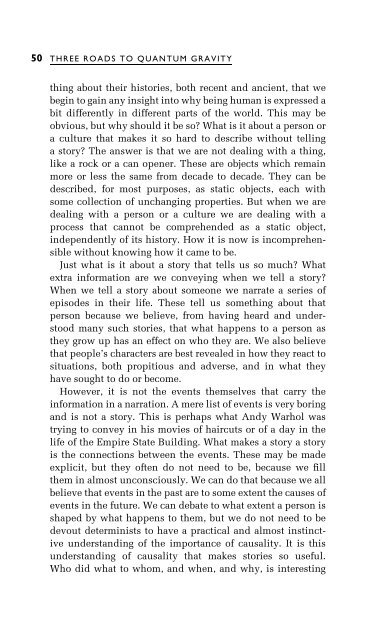
![arXiv:1001.0993v1 [hep-ph] 6 Jan 2010](https://img.yumpu.com/51282177/1/190x245/arxiv10010993v1-hep-ph-6-jan-2010.jpg?quality=85)


![arXiv:1008.3907v2 [astro-ph.CO] 1 Nov 2011](https://img.yumpu.com/48909562/1/190x245/arxiv10083907v2-astro-phco-1-nov-2011.jpg?quality=85)
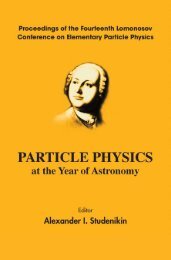
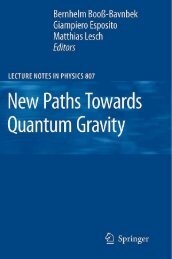
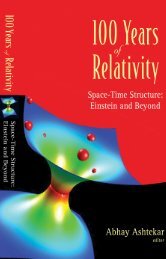
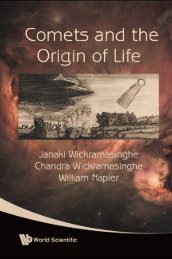
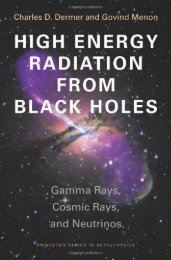
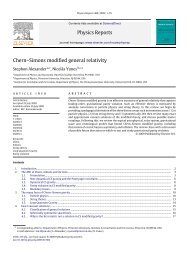
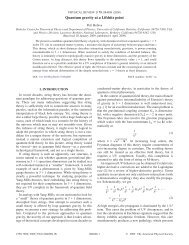

![arXiv:1002.4928v1 [gr-qc] 26 Feb 2010](https://img.yumpu.com/41209516/1/190x245/arxiv10024928v1-gr-qc-26-feb-2010.jpg?quality=85)
![arXiv:1206.2653v1 [astro-ph.CO] 12 Jun 2012](https://img.yumpu.com/39510078/1/190x245/arxiv12062653v1-astro-phco-12-jun-2012.jpg?quality=85)
